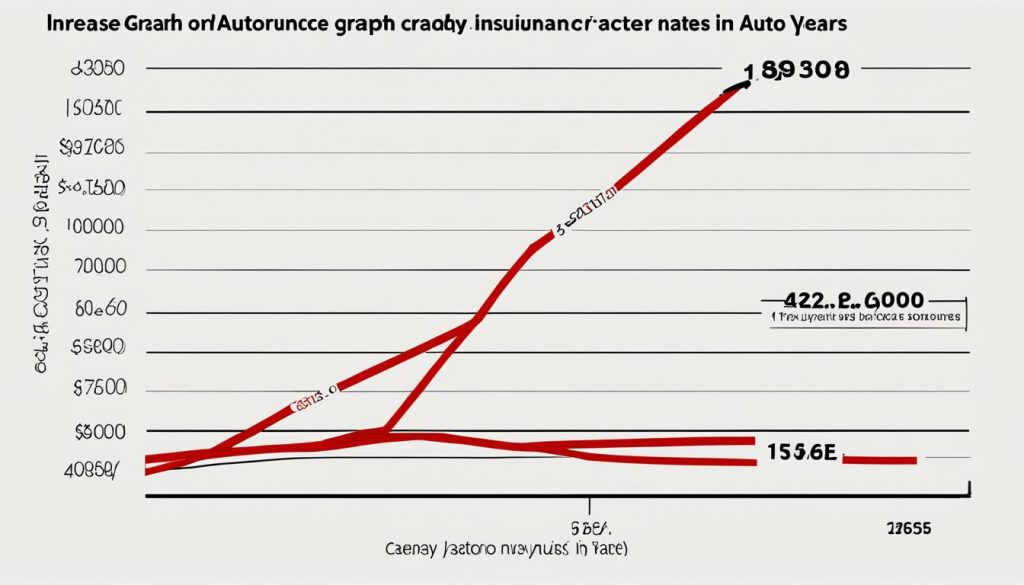Changing car insurance in Massachusetts can be a daunting task, but it doesn’t have to be. Whether you’re looking to switch insurance providers, adjust your coverage, or modify your policy, it’s important to be well-informed and prepared. In this article, we’ll provide you with essential tips to help streamline the process and ensure that you make the right decisions for your car insurance needs in Massachusetts.
Key Takeaways:
- Shop around for better car insurance rates in Massachusetts.
- Consider bundling your car and home insurance policies for potential discounts.
- Maintain your home to avoid potential claims and keep your insurance premiums down.
- Explore additional insurance policies or endorsements to fill coverage gaps.
- Understand the impact of technology on car insurance rates and be prepared for increased repair costs.
- Be aware of factors driving auto insurance rate increases and seek ways to lower your premiums.
Understanding the Factors Driving Insurance Price Increases
The cost of insurance in Massachusetts has been on the rise, and there are several factors contributing to these price increases.
Firstly, the advancement of car technology has resulted in vehicles that are safer but also more expensive to repair. With the increased use of sensors and intricate systems, the average cost of fixing a car has increased by 36% in the past five years.
Additionally, insurance payouts have also seen a rise, which directly impacts the premiums for policyholders. As insurance companies pay out more for claims, they pass on these costs to consumers in the form of higher premiums.
Furthermore, natural disasters such as hurricanes and wildfires have had a significant impact on insurance costs. The need to repair homes damaged by these events has become more expensive, leading to increased insurance payouts and subsequent price hikes.
“The advancement of car technology has increased the complexity of repairs, resulting in higher costs.”
This challenging landscape poses a financial strain on policyholders, making it crucial to understand the factors driving insurance price increases.
The Impact of Car Technology
One major factor behind insurance cost increases is the rapid advancement of car technology. While these innovations have undoubtedly made driving safer, they have also introduced more sophisticated systems that require specialized repairs.
For instance, modern cars rely on a multitude of sensors and computerized components. While these features enhance safety and performance, their repair or replacement can be costly due to the equipment and expertise required.
The increased complexity resulting from car technology has inevitably driven up the costs of repairs, which in turn impacts insurance premiums.
The Rise in Insurance Payouts
Insurance payouts have experienced an upward trend, impacting the overall cost of insurance policies. This increase in payouts stems from a variety of factors, including higher medical costs, inflated property values, and a growing number of claims.
As insurers pay out more for claims, they adjust their premiums to account for these increased expenses. It is important to note that insurance payouts directly correlate to the cost of insurance coverage, making them a significant driver of price increases.
The Impact of Natural Disasters
Natural disasters, such as hurricanes and wildfires, have wreaked havoc across the country, resulting in significant property damage and insurance claims. The massive costs associated with repairing and rebuilding homes after these events have put additional pressure on insurance providers.
With the rising frequency and severity of natural disasters, insurance companies are faced with mounting expenses that need to be covered. Consequently, policyholders must bear the burden through increased premiums.
In summary, insurance price increases in Massachusetts can be attributed to various factors, including car technology advancements, higher insurance payouts, and the impact of natural disasters. These influences serve as a reminder for consumers to carefully evaluate their coverage options and seek the best possible rates.
Tips for Saving Money on Insurance in Massachusetts
When it comes to insurance, finding ways to save money is always a top priority. In Massachusetts, there are several strategies you can implement to lower your insurance costs and keep more money in your pocket. Here are some tips to help you save:
1. Shop Around for Insurance
One of the most effective ways to save money on insurance is to shop around and compare quotes from different insurance companies. Each insurer has its own pricing and coverage options, so taking the time to explore your options can help you find the best deal that meets your needs.
2. Bundle Your Policies
Another way to save money is by bundling your car and home insurance policies with the same provider. By doing so, you can often qualify for a multi-policy discount, which can lead to significant savings on your premiums.
3. Maintain Your Home
Taking care of your home can also help lower your insurance premiums. Regular maintenance, such as keeping your roof in good condition, updating your home’s electrical and plumbing systems, and installing security measures like smoke detectors and burglar alarms, can reduce the risk of damage or loss, resulting in lower insurance costs.
4. Raise Your Deductibles
Consider raising the deductibles on your insurance policies to save on premiums. A deductible is the amount you have to pay out of pocket before your insurance coverage kicks in. By increasing your deductibles, you’re taking on more financial responsibility in the event of a claim, which can lower your premiums.
5. Sign up for Automatic Payments
Many insurance companies offer a discount if you set up automatic payments. By enrolling in automatic payments, you ensure that your premiums are paid on time, and in return, you may be eligible for a discount as a way to encourage consistent and timely payments.
Implementing these tips can help you save money on insurance in Massachusetts. Whether it’s shopping around for the best rates, bundling policies, maintaining your home, raising deductibles, or signing up for automatic payments, taking proactive steps to reduce your insurance costs can make a significant difference in your budget.

Understanding Coverage Gaps and Additional Policies in Massachusetts
When it comes to insurance coverage, understanding the potential gaps in your policies is crucial. Massachusetts residents should be aware of the limitations of their standard homeowners insurance policies and consider additional coverage options to protect themselves against potential risks. Let’s explore some common coverage gaps and the additional insurance policies available to fill those gaps.
Types of Coverage Gaps
Standard homeowners insurance policies in Massachusetts do not typically cover certain types of damages, such as flood damage or sewer backups. This means that if your home is damaged by a flood or if your sewer backs up, the repair and restoration costs may not be covered under your basic policy.
Flood Insurance
To protect your home against flood damage, it is recommended to purchase a separate flood insurance policy. This type of coverage will help cover the costs associated with flood-related damages, including property damage and the replacement of belongings.
Sewer Backup Coverage
If you want coverage for sewer backups, consider adding a sewer backup endorsement or separate policy. This will ensure that you are financially protected in case of a sewer backup, which can cause extensive damage and require expensive repairs.
Other Additional Policies
Depending on your location and specific needs, other additional insurance policies may be necessary. For instance, if you live in a coastal area prone to hurricanes, it’s important to understand hurricane deductibles, which may apply in certain situations. Earthquake coverage is another type of insurance that is typically not included in standard homeowners policies but may be necessary for those living in earthquake-prone regions.
If you have valuable possessions, such as jewelry or artwork, it’s essential to consider a special endorsement or floater that provides coverage for their full value. This will ensure that you are adequately protected in case of loss or damage to these valuable items.

Workers Compensation Insurance
Lastly, workers compensation insurance should be taken into account if you employ permanent domestic employees or certain types of workers. This type of coverage provides financial protection in the event that an employee is injured or becomes ill while performing their job.
By addressing the coverage gaps in your insurance policies and considering additional coverage options, you can enjoy the peace of mind that comes with knowing you are adequately protected. Make sure to review your current policies and consult with an insurance professional to determine if any adjustments or additional policies are necessary for your specific needs.
Exploring the Impact of Technology on Car Insurance Rates in Massachusetts
The advancement of technology in cars has revolutionized the automotive industry, but it has also had a significant impact on car insurance rates in Massachusetts. One of the key factors driving the higher rates is the increased complexity of car parts, particularly sensors, which are now integral to many modern vehicles. These sophisticated sensors enhance safety features and assist in the overall driving experience. However, their intricate design and repair requirements have resulted in higher auto repair costs. As a result, insurance providers have had to adjust their rates to account for these increased expenses.
Furthermore, the shortage of microchips in the global market has exacerbated the situation. Microchips are now essential components of many car systems, including those that enable advanced safety technologies. The shortage of microchips has caused delays in car repairs, leading to higher costs for consumers. As insurance companies incur higher claims costs due to these delays, they pass on the expenses to policyholders through higher insurance rates.
This impact on car insurance rates is further compounded by the shortage of auto repair technicians in the industry. With the increasing complexity of modern vehicles, repair technicians need specialized training and expertise to diagnose and fix car issues. However, there is currently a shortage of skilled technicians, leading to longer wait times for repairs and higher costs. The limited availability of qualified technicians drives up the labor costs for repairs, which in turn, affects car insurance rates.
It is important for car owners in Massachusetts to be aware of these technological and market factors that affect their car insurance rates. Understanding how car technology, auto repair costs, microchip shortages, and the shortage of repair technicians contribute to higher rates can help individuals make informed decisions when it comes to their car insurance coverage.

Understanding the Factors Driving Auto Insurance Rate Increases
Auto insurance rates in Massachusetts have been on the rise due to several key factors impacting the industry. These factors include increased repair costs, a shortage of auto repair technicians, insurance losses from car crashes, and the impact of the pandemic.
The rising costs of auto repairs have been a major contributor to the increase in insurance premiums. As cars become more technologically advanced, the cost of repairing them has also increased. The intricate sensors and complex systems in modern vehicles require specialized expertise, leading to higher repair bills.
Furthermore, there is a shortage of auto repair technicians, which has resulted in delays and increased costs. With fewer skilled professionals available, repairs take longer to complete, increasing the time and expense for insurance companies and ultimately driving up premiums for consumers.
The shortage of auto repair technicians has led to delays and increased costs for consumers.
Insurance companies have also been facing higher losses from car crashes, particularly during the pandemic. The economic impact of the pandemic has affected driving patterns, resulting in an increase in accidents and insurance claims. These losses put additional financial pressure on insurance companies, leading to higher premiums for policyholders.
Overall, a combination of increased repair costs, a shortage of auto repair technicians, insurance losses from car crashes, and the impact of the pandemic has contributed to the rise in auto insurance rates in Massachusetts.

Seeking Ways to Lower Your Auto Insurance Bill in Massachusetts
If you find that your auto insurance bill has increased and there have been no changes to your account, there are steps you can take to lower your premiums. One option is to ask your insurance agent to shop around for lower rates or higher deductibles. They have access to a variety of insurance providers and can help you find the best rates for your coverage needs.
Increasing your deductible is another strategy to consider. By opting for a higher deductible, the amount you pay out of pocket in the event of a claim increases. However, this can result in lower premiums overall. It’s important to carefully evaluate your financial situation and ensure that you have the funds available to cover the deductible if you do need to make a claim.
Lowering your auto insurance bill in Massachusetts is possible with the right approach. By exploring options such as asking your insurance agent for lower premiums or higher deductibles, you can find ways to reduce your monthly expenses while still maintaining the coverage you need. Remember to always assess your individual circumstances and consult with your insurance agent to find the best solution for your specific situation.

Adjusting Your Coverage and Premiums
When looking to lower your auto insurance bill, it’s essential to understand that adjusting your coverage and premiums can have an impact on your overall costs. While increasing your deductible can lower your premiums, it’s important to carefully weigh the potential savings against the out-of-pocket costs you would incur in the event of a claim.
Additionally, it may be beneficial to review your coverage to ensure it aligns with your current needs. For example, if you have an older vehicle with a low market value, you might consider reducing or eliminating comprehensive and collision coverage, which primarily protect the vehicle itself.
Exploring Discounts and Savings
Many insurance companies offer various discounts that can help you lower your auto insurance bill. These discounts may be based on factors such as your driving history, the safety features in your vehicle, or your membership in certain organizations.
Be sure to inquire with your insurance agent about any potential discounts you may be eligible for. They can provide information about available savings and help you determine which discounts you qualify for.
Tip: Don’t forget to ask your insurance agent about multi-policy discounts. Bundling your auto insurance with other types of coverage, such as homeowners or renters insurance, can often lead to additional savings.
Lowering your auto insurance bill in Massachusetts requires proactive steps and careful consideration. By exploring options such as adjusting your coverage and premiums, and taking advantage of available discounts, you can potentially reduce your monthly expenses while maintaining the necessary coverage for your vehicle.
Conclusion
Changing car insurance in Massachusetts can be a daunting task, but with the right approach, it can lead to significant savings. By understanding the factors that drive insurance price increases, you can make informed decisions about your policy. Implementing the tips provided, such as shopping around for better rates and bundling your policies, can help you optimize your coverage and lower your premiums.
It’s also essential to maintain your home to avoid potential claims and consider additional coverage for specific risks. By raising your deductible and signing up for automatic payments, you can further reduce your insurance costs. Remember, every step you take towards adjusting your policy can result in potential savings.
When it comes to changing your car insurance, it’s vital to do your research and explore all available options. Don’t be afraid to ask your insurance agent for lower premiums or seek advice on policy changes. With a little effort and the right knowledge, you can find the policy that best suits your needs and budget. Start saving today by making the necessary adjustments to your car insurance policy.




No comments! Be the first commenter?